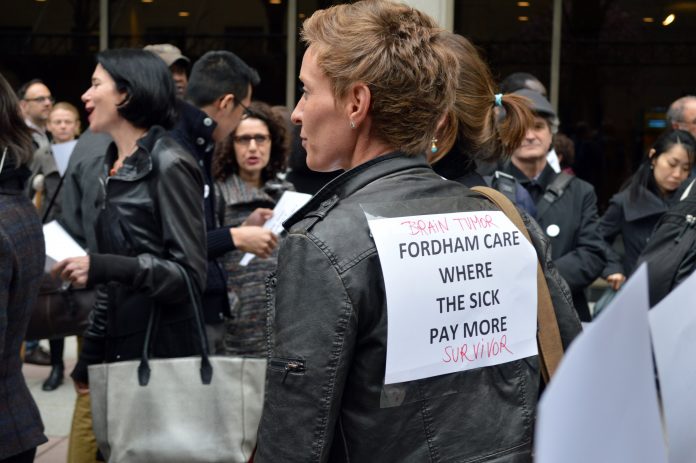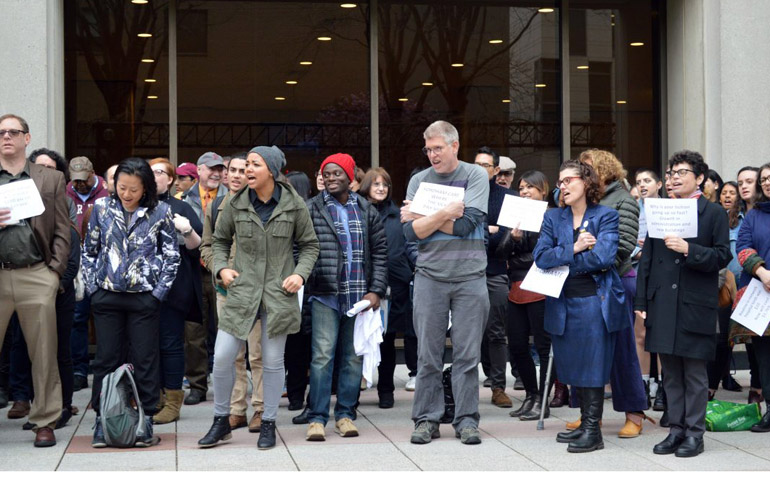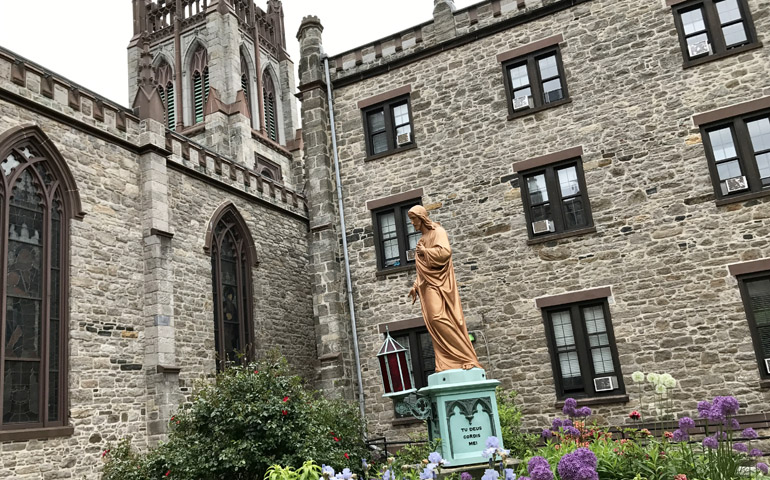
A Fordham University faculty member sports a personalized protest flyer during a rally on April 19. The faculty passed a vote of no confidence in Fordham President Jesuit Fr. Joseph McShane's leadership the same day. (The Observer/Elizabeth Landry)
Over coffee at Rex, the hip, Upper West Side shop that Fordham University students haunt, Kyle Pritz, 28, pauses to hold his glasses up sideways. It looks as if something has taken a bite out of the piece of the plastic temple that ought to cover the right hinge. The missing part broke off about five weeks prior during a struggle with Fordham security.
Sustaining injuries and broken glasses and getting slapped with disciplinary action by the Jesuit school, which forced him, he said, to take an incomplete rather than graduate on time, wasn't how things were supposed to go. Pritz, who grew up an hour north of Manhattan in Carmel, New York, chose Fordham for its values and participation in the Yellow Ribbon Program.
As a veteran, Pritz paid neither tuition nor fees at Fordham, which has touted a "veteran-friendly" reputation since the Civil War. Raised Lutheran, he isn't religious but was drawn to Fordham's mission. "I like how the Jesuits' conception of God is God in everything," he said. He was also impressed with Fordham's social justice emphasis and what he understood to be the Jesuit history of "standing with the oppressed against corrupt and unjust power structures."
That same sense of social justice led Pritz, a philosophy and psychology double major, to join about 50 students and faculty on April 27 outside Walsh Library, some 9.5 miles north of Rex on Fordham's Bronx campus. The group voiced support for contingent, or adjunct, faculty, whose unionizing efforts the administration sought to block on religious grounds. The protesters then walked a couple of minutes northeast to Cunniffe House, home to the office of Jesuit Fr. Joseph McShane, Fordham's president.
What happened next is the subject of much dispute between the administration and professors and students, and it is one of several incidents that threaten to further divide a campus upon which 80 percent of tenured and tenure-track faculty on April 19 voted — at a rate of 88 percent — no confidence in McShane.
Escalating tensions
On a recent visit, Fordham's Bronx campus is a study in lush, sprawling lawns and iconic gray and brown Gothic-styled buildings, which lend the 85 acres a monastic, meditative feel. Turning corners on the campus, which is near the Bronx Zoo and the New York Botanical Garden, visitors chance upon religious sculptures and crosses. Even the trees on this well-manicured campus have identifying tags revealing their species, and crimson banners celebrate Fordham's recent 175th birthday and its U.S. News & World Report ranking: tied for 60th in the nation.
It is hard to imagine such an idyllic place could be the focus of such conflict. To outsiders, a vote of no confidence in McShane by faculty might sound like the kind of thing that would keep a university president up at night, but Fordham didn't interpret the statement as indication of a true lack of confidence support in leadership. Bob Howe, assistant vice president for communications and a special adviser to McShane, notes that in the last fiscal year alone, 23 votes of no confidence have been leveled against presidents or other senior officials at U.S. colleges and universities.
"It is an increasingly common tactic in labor negotiations," he said.
But the vote didn't feel like a stunt to Eric Anthamatten, an adjunct philosophy professor of five years at Fordham, who voted with colleagues in a parallel adjunct no-confidence vote, with similar results. "I felt a general sense of solidarity," he said over coffee, some 35 blocks north of Fordham's Manhattan campus.
Anthamatten, who holds a doctorate, has taught six courses on three campuses in the same semester and often has to tell students he isn't sure where his office hours will be held. For three months last year, he had an unanticipated insurance coverage gap.
"I was in this doughnut hole without insurance for three months. When I was doing my taxes this year, I almost got fined," he said. "I was like, 'Just don't go to jiujitsu for three months, so you don't break any bones.' "
For a change, being an adjunct didn't feel solitary when Anthamatten joined about 100 professors at an April 19 rally at Lincoln Square Plaza. (There was also a rally the following day on the Bronx campus.) "It's not just something about a disgruntled individual," he said. At the time he tweeted, "Proud to stand with fellow [Fordham] faculty in our vote of no confidence against the Board of Trustees and Father #McShame."
The rally was one of several incidents in the past six months that have brought tensions to a boiling point. On Jan. 23, nearly 100 people gathered on the Manhattan campus to protest Fordham's Dec. 22, 2016, decision to block a chapter of Students for Justice in Palestine. That came after the student government approved the club's application, filed in November 2015, reported the student-run Fordham Observer.
Less than a month later, about 130 professors participated in a silent protest on Feb. 2 during a board of trustees meeting. Professors were protesting proposed health care changes and "the administration and board's attempt to hold faculty salaries hostage," said Andrew Clark, a French and literature professor and chair of the Fordham faculty salary and benefits committee. Clark was one of many professors who put duct tape over his mouth during the protest. He removed the tape after entering the meeting. "Especially when you have a beard, it's a little bit more painful, but it was fine," he said.
As board members walked into the meeting, 99 percent didn't even look at the professors, according to Clark. "It became very clear that the board thinks we are just greedy," Clark said. "There were members of the board who made comments like, 'You are being paid and having benefits that are far too rich for people who only work nine months a year and only teach 12 hours a week.' "
Two months later, protesters again gathered, this time on April 8. They were supporting adjunct faculty's efforts to unionize through the Service Employees International Union, also known as SEIU. Fordham had sought to block unionization. It cited a religious exemption, and the unionization effort was withdrawn April 3. "SEIU and the contingent faculty decide to withdraw their application with the NLRB," the National Labor Relations Board, "fearing an intolerant Trump NLRB unsympathetic to unionization," Clark said. "After significant protest and ongoing lobbying by SEIU, students, and faculty, President McShane reversed that decision."
McShane did so in a letter to the Fordham community on May 19 — the day before graduation — stating that the university would not oppose the unionization of adjunct faculty. That came about three weeks after the April 27 protest, where Pritz's glasses broke.
The no-confidence vote was accompanied by another protest, during which "a wooden coffin, featuring 'Fordham Cares,' painted on the side, held medical equipment like cloth bandages and crutches that faculty passed out in keeping with the rally theme of a 'Sick-In,' to protest the possible rise in costs," the Observer reported.

Various members of the Fordham community gather on the Fordham Lincoln Center plaza for a "Sick-In" protest on April 19. (The Observer/Elizabeth Landry)
Tone-deaf pattern emerges
The events are "very connected" and demonstrate the university's "kind of disrespect for the rule of law," Clark said. "Many students and faculty are dismayed by the lack of free speech that is present on campus."
The university's tone has also been problematic, faculty say. Official communications can be patronizing even as they are infused with religion, according to Anthamatten. He describes the tone as, "It's the father, the dean, or the president speaking, so shut up," which he sees as incongruous with the great social justice sense of another Jesuit, Pope Francis.
A "recovering Catholic," Anthamatten appreciates Fordham's emphasis on his discipline, philosophy, but contrasts that with its invoking religious exemption to block his and colleagues' unionization efforts. "I think there is a hypocrisy or a dissonance," he said. Nonetheless, Fordham's actions have made him more curious about Jesuit history and beliefs, and the non-practicing Catholic, who says he weirdly identifies as Catholic, has been reading up on the subject.
Clark points to the May 19 email from McShane, in which the president stated Fordham wouldn't block adjunct unionization "after much consultation and reflection" and after becoming "convinced of the rightness of this course of action over the last few months by conversations with my fellow Jesuits." The letter goes on to say that organized labor has "deep roots in Catholic social justice teachings."
Though the decision was what many had hoped for, the letter made many very unhappy, according to Clark.
"It didn't recognize what many people believe were the true Jesuit actions of those students, who risked their own academic careers to engage in peaceful civil disobedience in order to try to fight for others," he said. "It wasn't for their own benefit."
Clark thinks Fordham would have pursued the religious exemption clause if not for recent events. "If there had not been a student protest, if there hadn't been the press and the altercations around the student protest, I am 100 percent confident that the epiphany that Fr. McShane had on the night before commencement would never have occurred," he said. And a "fact check" that Fordham posted on its website in response to the actions of the 14 students, including Pritz, also struck a tone that upset some. "It's a tone of total condescension and arrogance that's punishing," Clark said.
On Fordham's graduation day, May 20, many professors affixed pins stating "88%," "Cura Personalis" — Latin for the Jesuit concept of "Care for the whole person" — with a broken heart, and "Cura Personalis #broken" to their doctoral robes, and some duct taped "88%" — the number who voted no confidence — to their backs in protest of the president, Clark said.
When a professor told Pritz during office hours that he was having trouble getting his insurance to cover a brain surgery he required, Pritz was floored. "I was surprised how ignorant I was of these things, which had been going on for a while," he said. Pritz couldn't understand why Fordham wouldn't realize it was in its best interest to care for its faculty.
Heading uptown on April 27 to protest on behalf of contingent faculty, Pritz had no idea things would get physical. He and 50 others chanted, "What's outrageous? Poverty wages," and "What's disgusting? Union busting," on the steps to the library, as he supported professors he believes changed his life. "It felt right to be there," he said.
As the group headed to the president's office, Pritz first noticed three public safety officers — a group he'd never before observed. "They're like a secret police force," he said, noting that campus security usually check students' IDs when they enter campus. When he learned the officers' names during the subsequent disciplinary process, Pritz crosschecked them on LinkedIn and learned they were all ex-NYPD.
Howe confirmed that public safety officers "are indeed former ranking officers of the NYPD," but added that the "tactics they used are consistent with their training, and with university protocols."
With the officers in tow, the group walked to Cunniffe House, expecting to deliver a written message to the president and dialogue with him. Sensing an escalation in the vestibule, Pritz, who was standing on the stairs, dropped his corner of a banner and maneuvered through an opening in the doorway. Inside, an officer, his back to an inner door, tried to hold protesters at bay.
"I knew instantly that we were facing a very corrupt power structure at this moment," Pritz said. "Why are these officers here?"
Pritz would unbolt both latches on the exterior door, as three officers grabbed at his clothes and arms. He was left with burn marks all over his body. "It was definitely obvious that I was in a struggle," he said. "They were very forceful."
Pritz's glasses broke, and as he sought to assist a student whom the guard at the interior door was pinning, Pritz felt the officer's elbow dig into his belt area. "He does this defensive thing and pins my head down," Pritz said. (Howe said no students required medical support that day, although Fordham officers did.)
Six minutes after the physical altercations began, the students understood getting inside was a lost cause and filtered out. Walking down the stairs, Pritz, who doesn't see well without his glasses, recognized two classmates from a class. One said, "I can't believe this is happening at a Jesuit school."
Pritz responded, "This is not a Jesuit institution."
"The decision to move against health insurance by the trustees strikes us as a decision to move against the Jesuit traditions of this institution."
-Micki McGee, professor, Fordham's faculty senate president-Micki McGee, professor, Fordham's faculty senate president" target="_blank">Tweet this
Cura personalis vs. bottom line
That decision Pritz arrived at — that Fordham wasn't acting like a Jesuit school — has other adherents as well, who note the irony of Fordham upholding the Jesuit concept of cura personalis, care of the whole person, as it traded down on health benefits.
Those cuts directly violate Fordham's mission, according to Micki McGee, a sociology and American studies professor and Fordham's faculty senate president.
"The decision to move against health insurance by the trustees strikes us as a decision to move against the Jesuit traditions of this institution," she said. "It's to our mind immoral."
McGee and Clark describe a campaign of coercion, intimidation and shifting goalposts that unfolded over years, in which Fordham first encouraged faculty to move to cheaper, lower-quality plans and then unilaterally changed salaries and benefits without their input. The no-confidence vote came against the backdrop of "incredibly unproductive and frustrating negotiations," during which the university "summarily dismissed" faculty benefits proposals without offering any of their own, McGee said.
After seven months, the faculty felt that the university wasn't negotiating fairly. "That's something else, and I'm polite enough not to mention what it is," she said.
Howe contests this. Fordham shared "hundreds and hundreds of pages," including substantial proposals, with the faculty between September 2016 and May 2017, he said. It's one of many points that the university and the professors see very differently. "Faculty were never coerced or threatened," said Howe, who calls the process by which the new health plan was selected "standard and rigorous." (Clark said Fordham stacked the deck in a "quasi" request for proposal process.)
Faculty say that they were forced to concede in compromise after compromise, and that their contributions went up 27 percent in 2015, and again in 2016. Howe said that last figure only amounted to another $8 per paycheck in 2016. The university also sees the developments in a broader context, in which premiums are rising nationally. And where administrators paid 15 percent in cost-sharing each year from 2014 to 2017, faculty increases only rose "very gradually" from 10 percent in 2014 and in 2015 to 11.25 percent in 2016, and 12.5 percent in 2017, according to Howe. Faculty rates will only reach 15 percent by 2019, "a cost-share rate that is quite low across higher education and other sectors," he said.
Not only is Fordham not shortchanging faculty, Howe said, but it's a leader in its generosity. Fordham's board, he said, is committed to the university's goal of keeping faculty salaries in the top 20 percent in the nation. "Our faculty are — and should be — as well-compensated as we can afford," he said, and "are among the top 10 percent of the country in compensation."
But the university's consultant, Mercer, estimated that Fordham would face an increase of more than 60 percent in health insurance costs over three years if the plan wasn't changed, according to Howe. "As it is, Fordham's new health insurance plan, which will begin Jan. 1, 2018, still provides excellent benefits, and helps slow the increase of health insurance costs to the university," he said. McShane has insisted that faculty and staff receive salary increases every year during his tenure, Howe added.
Fordham's board of trustees has mandated curbing rising tuition costs, in line with its founding as a school for first-generation students, many of them immigrants.
"We are a mission-driven university. We teach intellectual rigor with care for the whole person. We promote service to the human family, and we value diversity and inclusion," Howe said. "We offer our students a global education, training them to not just lead successful lives, but lives worth living. If it is a 'daring and dangerous undertaking,' as our founder said, it is also an expensive one."
But with a "modest" endowment, Fordham is subject to forces beyond its control and has to allocate resources among many worthy objectives, according to Howe.
"We believe a Fordham education is well worth the price, but we are keenly aware that the cost of a college education is out of reach for too many students," he said. "We do our best to strike a balance between the cost of tuition, the richness of our offerings in and out of the classroom, and superior compensation for our faculty and staff, among many other needs."

The Bronx, New York, campus of Fordham University on May 24 (Menachem Wecker)
'We are at a crossroads'
Clark and McGee mention two colleagues, both people of color, who turned down offers from more prestigious schools to come to Fordham. One recently left, and the other is considering it. Having used the health plan to recruit two other faculty members of color recently, Clark said, "I'm not going to be able to use that recruitment in the future."
The state of Fordham's finances is also subject to interpretation. Clark and McGee cite a 2016 Moody's A2 rating, the agency's second-highest offering, which is the highest Fordham has ever received. Moody's noted Fordham's "very good market position as a prominent Jesuit institution located in New York City, consistent modest growth in net tuition revenue, and strong fundraising to support capital investment and operations."
"This is an institution that's doing fine financially," McGee said, although she believes Fordham lagged behind other schools when it came to fundraising in the 1960s and 1970s.
"If you don't put retirement money in your retirement fund when you're 20, it's much harder to do when you're 50," she said. "The capital that allows you to live by your values, if you choose to live by your values, is not as available to Fordham as it is at other better-endowed institutions."
McShane predicted in 2003 that Fordham's endowment would reach $1 billion by 2011. Instead, it barely reached $500 million. Clark knows of no professor who wouldn't be willing to compromise if the university was in dire financial state, but he said professors are kept in the dark about budget specifics. No sooner had the university brought in $27 million one year that it was then announcing that money was tight, as it would begin expensive building projects. "We've never run a deficit, ever, at this institution" in the eight years that Clark has worked at the school, he said.
"In retrospect, the stated goal of reaching the $1 billion mark by 2011 for our endowment seems a bit overly ambitious," Howe admits about McShane's 2003 prediction. He cited the 2008-09 recession as a factor in the failure to meet that prediction.
Whatever the state of Fordham's finances, McGee and Clark say there is something special about the university, which is now at risk.
"We are at a crossroads, and there is no way to know which way it's going to go. We hope it goes toward some kind of reconciliation process, where we can feel assured that our board and our administration are not going to come after our livelihood like they did this year," McGee said, noting that by livelihood she means not salary, but "the ability to be alive, because the health care cuts are literally things that would cause people's lives to end."
Even atheist and nonreligious faculty believe there is something unique about Fordham, though it may be more for them about social justice and care than something particularly Catholic, Clark said. While some would prefer to see social justice emphasized more, others hope the university will become more explicitly Catholic and Jesuit.
"There are certainly divisions on campus about what it means, but there's not one member of this community who doesn't think that this place is distinctive because of the kind of care for others, and the kind of family and community that is here," Clark said.
As things stand, McGee and Clark say they would have a lot of trouble encouraging fellow professors to apply for jobs at Fordham. They would still advise students to come, because of the university's social justice agenda and the rigor of its academic programs. But McGee, who took a pay cut to come to the university because of its substantial health benefits, said there are "formidable" challenges looming.
"A faculty that can't afford to go to the doctor is not going to be your healthiest faculty. They're not going to be your most available faculty," she said. "A faculty that's fighting 75 hours over a single health insurance claim — and that would be me in a particular case I encountered in 2015 — doesn't have 75 hours to engage with colleagues and students. I think that's an invisible cost that the institution has just incurred."
"I think there's still hope, but I think we are at a critical moment," Clark added. "There are only so many times that people are going to come out to fight. And I think we are at the end."
[Menachem Wecker is co-author of the book Consider No Evil: Two Faith Traditions and the Problem of Academic Freedom in Religious Higher Education.]
Advertisement








